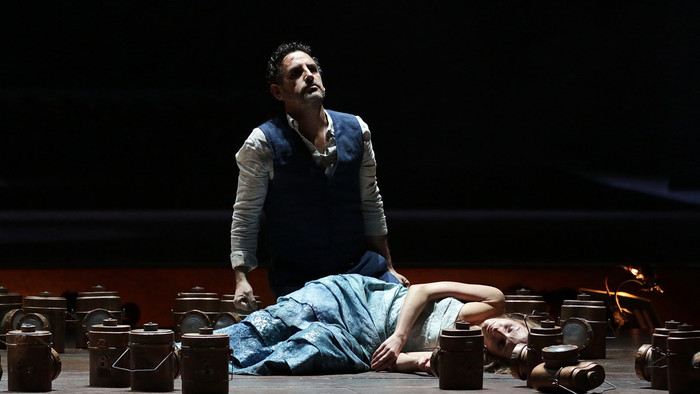Cast & Crew
Orfeo – Juan Diego Flórez
Euridice – Christiane Karg
L’Amour – Fatma Said
Conductor – Michele Mariotti
Directors – Hofesh Shechter , Джон Фуллджеймс
Set and Costume Designer – Conor Murphy
Lighting Designer – Lee Curran
Description
Juan Diego Flórez dazzled audienced and critics alike when he played the virtuoso role of Orphée in La Scala’s first ever staging of Gluck’s opera in its French version: “Juan Diego Flórez delivered a lesson in style. His tone is darker and his projection more self-effacing than in the past, but class is permanent. His agility and legato are utterly thrilling. The ovations were never-ending.” (Corriere della sera)
Summary
Act I
A secluded spot with Eurydice’s tomb.
At the tomb of Eurydice, who died from a snakebite a few days after marrying Orpheus, a chorus of Nymphs and Shepherds have gathered to perform the funeral rites. The chorus is interrupted by the cries of Orpheus who, in his grief, utters his bride’s name. Once alone, the poet gives vent to his sorrow, addressing the Gods and swearing that he would not hesitate to descend to the underworld to get back his beloved bride.
Suddenly, Love appears to Orpheus and tells him that, moved by his singing, the gods have decreed that he may go to the underworld and endeavour to bring Eurydice back to earth, but on condition that, while returning with her, he must never turn around to look at her, not even for a moment. If he does, Eurydice will be lost to him forever. Orpheus, after a moment’s hesitation, says he is ready to obey the rule and departs for the underworld.
Act II
The gateway to Hades
In a horrid, infernal place, on the other side of the river Cocytus, the Furies and other devilish figures dance and sing amid the smoke and the flames. Orpheus arrives with his lyre and, thanks to the liberating power of music, he manages, not without difficulty, to calm the hellish creatures. The gates of Hades open and the Furies allow Orpheus to pass, but as soon as he disappears, they begin their wild dance once again.
The Elysian Fields
The Elysian Fields
The scene moves to the Elysian Fields, home to the Blessed Spirits who, forgetful of their earthly cares, spend their days in an unending state of peace. Among them is the veiled Eurydice, who sings of the still calm of that place. As she leaves the scene, Orpheus enters it. He is astonished at the air of absolute tranquillity that reigns in the Elysian Fields. He soon begins his search for his bride, asking the aid of the Blessed Spirits. They bring Eurydice to him and, without her veil, she recognises her husband. Without looking at her, Orpheus takes her by the hand and guides her towards the gateway that leads out of Hades.
Act III
A dark cave leading to the gates of Hades
Following the tortuous path through the rocks in an atmosphere of shadowy darkness, Orpheus leads Eurydice out of the underwood. She is reassured by the sound of her husband’s voice telling her to follow him and keep hold of his hand, but she soon asks Orpheus to stop for a moment: she cannot understand why he refuses to look at her. Eurydice’s uneasiness turns into anguish and then despair. She stops and bids her husband a final farewell. Orpheus can no longer resist: he turns and Eurydice dies. Overwhelmed by his sorrow, he tries to help her, but there is nothing he can do. Orpheus sings of his sorrow and decides to take his own life to follow his beloved into the tomb.
Again, Love appears: he keeps Orpheus alive and brings Eurydice back to life by the touch of a finger. The couple are together with the chorus of Nymphs and Shepherds, celebrates the god of Love and his followers.
Screenings
Runtime
2 h. 9 min.
Language
Recorded screening: French, russian subtitles
12+
